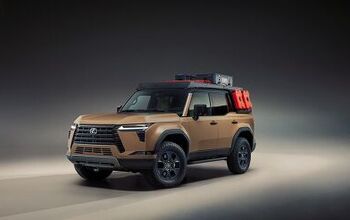After the Fall: New Vehicle Sales Predicted to Dip Next Year, Bottom Out in 2019

After riding the sales roller coaster to dizzying, record-breaking heights, it’s only natural that consumers will bring automakers back down to reality.
This year will be a high water mark for new vehicle sales in the U.S., according to a new study by consulting firm AlixPartners (via Automotive News). Sales are forecasted to hit 17.8 million vehicles this year, but a downturn is on the way, and the industry won’t start to see a rebound until the coming decade.
The past seven years saw year-over-year growth of new vehicle sales, reaching 7.45 million units in 2015. According to AlixPartners, after this year’s projected 17.8 million tally, sales will fall to 17.5 million in 2017 and 16.6 million in 2018, reaching a trough in 2019 with just 15.2 million sales.
The firm blames the looming slump on soft used-vehicle prices, an economy that isn’t on fire (but isn’t retracting, either), and slightly higher interest rates. Already, incentive spending is up, the delinquency rate on subprime loans is growing, and leasing is becoming ever more popular. This is causing a glut of used vehicles, which puts downward pressure on new vehicle sales.
For the industry, the predicted slump means even greater competition, more focus on volume models, and probably the need for more incentives.
So, when do the really good times return for automakers? If AlixPartners’ prediction comes true, slow growth returns starting in 2020, with sales projected to rise to 15.6 million that year, and 16 million in 2021. The final year of their outlook, 2022, shows sales reaching 16.8 million.
[Image: Faris/ Flickr]

More by Steph Willems


































Comments
Join the conversation
Well, we are sending about 1/2 a million VWs to the shredder in a privately financed government ordered Cash for Clunkers, so we have that...
Honestly, I wouldn't be surprised at a reduction in sales. How many million cars have been sold vs how many total vehicles over the past 7-year period? Granted, not everybody can afford a new car but it seems a very large percentage has purchased one recently so demand itself will need to slip a bit until the cars age enough to trigger the desire for a replacement. Such fluctuation is relatively normal for the industry even without the stigma of economic upset.
2016 will likely be the high watermark year, however it's hard to know what will happen afterwards. What we do know is that interest rates are not going to continue to go up. The markets are all predicting there will not be another rate hike this year, and after Brexit, the Fed will not be raising rates soon. The real question is whether the economy continues to grow in the next 18 months or whether there is a recession.
with the durability and quality of cars over the last few years, how are new cars sustainable? What's happening to all these used cars? They're not going to the crusher in 10 years like they used to. Shit, I own a 29 year old, 17 year old, and 16 year old car (in addition to two 2016 models) . . . . they're all running and driving great.